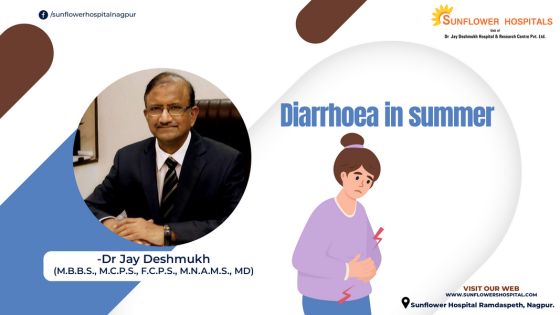Is diarrhoea dangerous?
According to WHO, this is the third leading cause of death in children up to 5 years of age. Each year world diarrhoea kills 443832 children under 5. In adults, severe diarrhoea can lead to severe dehydration, sepsis, or acute kidney failure.
Who is at more risk of getting diarrhoea and its complications?
Children who are malnourished or have impaired immunity, people living with HIV infection and those with impaired resistance like in diabetes, autoimmune disorders, very elderly and those with underlying kidney, liver, and cardiovascular diseases may get complications due to even minor forms of diarrhoea.
Why diarrhoea is common in summer?
Contaminated water and eatables, street food and street beverages may cause diarrhoea. Excessive dehydration due to exposure to hot weather poor water intake and sweating can lead to dehydration. When the body gets dehydrated it creates an imbalance in the flora of the intestines and creates imbalance in the immune system. This makes individuals more prone to common bacterial and viral infections resulting in diarrhoea.
What are the three clinical types of diarrhoea?
According to WHO, acute watery diarrhoea lasts several hours or days and includes cholera. Acute bloody diarrhoea also called dysentery is the second form. Persistent diarrhoea that lasts for 14 days or longer is the third type. Diarrhoea is a major cause of malnutrition in children, and malnourished children are more likely to get diarrhoea.
What are the key measures to treat summer diarrhoea?
Rehydration with oral rehydration salts and solutions. ORS is a mixture of clean water, salt, and sugar. ORS is absorbed in the small intestine and replaces the water and electrolytes lost in face. Zinc supplements reduce the duration of diarrhoea episodes by 25% and are associated with a 30% reduction in stool volume. Intravenous fluids may help in cases of severe dehydration. Using antibiotics in cases of summer diarrhoea is questionable.
What are the key features to prevent diarrhoea?
These include access to safe drinking water, improved sanitation, handwashing with soap, exclusive breastfeeding for the first 6 months of life, and good personal and food hygiene. Health education in schools and offices about how infection spreads and rotavirus vaccination is necessary.
When to see a doctor?
If diarrhoea persists beyond two days with no improvement, you become dehydrated, if there is severe abdominal or rectal pain, if you have bloody or black stools or have a fever above 102 degrees, then you must see your doctor.

